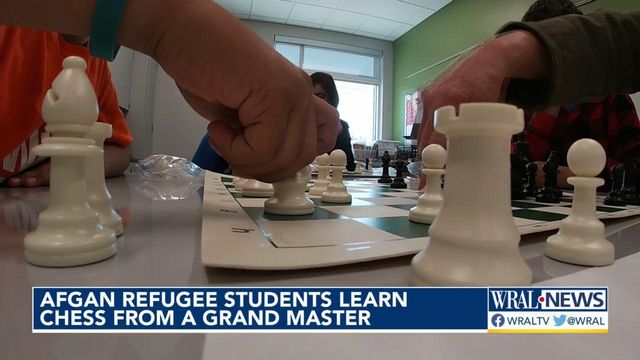Afghan refugees in Raleigh learn the game of their homeland while adjusting to new life
Elementary age Afghan child refugees now adapt to a new life in our state in the Wake County School system. They face barriers of both language and culture. That's why they were given an opportunity to learn an ancient game that was born in their homeland.
Posted — UpdatedElshan Moridiabadi, a chess grandmaster living Durham, spoke to the students at Stough Magnet Elementary School in Raleigh on Friday. Through a video screen with many chess board visuals, he introduced the students to kings, queens, bishops, noble knights, rooks and pawns.
"Chess has its roots in both Persia and India," said Carol Meyer, executive director of the U.S. Chess Federation, the governing body for chess competitions in the United States.
The refugees learned the proper position for each piece on the chess board and were soon were ready for competition.
One Afghan father of student was overjoyed to play the game of chess with his daughter for the first time in Raleigh, Meyers said.
The game of chess has a history of being scrutinized in Afghanistan.
"There was a time back in the early 2000’s, when the Taliban government was first installed, where chess was actually banned," she said.
With the Taliban now back in control, Meyer said, the game could once again become a crime.
Chris Cox says, principal of Stough Magnet Elementary School, said that chess game on Friday helped to break down barriers.
"Obviously, they are in a new place, at a new time and feeling very foreign to them," he said. "This is something that really gives them a little familiarity with something that they love, as simple as the game of chess."
Chess is a way for the refugees to communicate, even though they face a language barrier, Meyer said.
"That’s why we do what we do right? Just to have our kids and see that twinkle in their eye when they’re learning," Cox said.
Related Topics
• Credits
Copyright 2024 by Capitol Broadcasting Company. All rights reserved. This material may not be published, broadcast, rewritten or redistributed.





